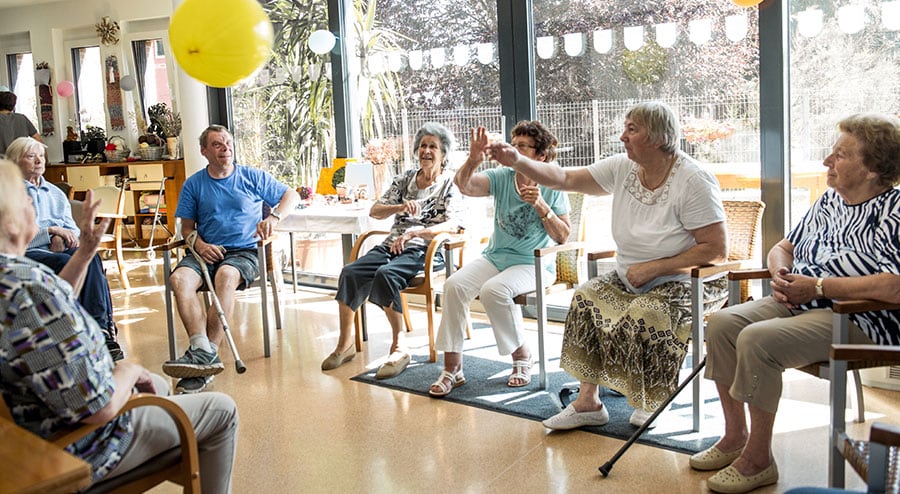Enjoy a secure and social environment in an Assisted Living community.
Enjoy a secure and social environment in an Assisted Living community.
Blog Article
The Role of Assisted Residing In Providing Specialized Take Care Of Dementia Clients
The stipulation of specialized treatment for dementia individuals within assisted living centers is progressively identified as an essential component of efficient mental deterioration monitoring. These settings are designed to address the unique cognitive and emotional difficulties faced by people with mental deterioration, using tailored assistance that advertises safety and security and well-being.
Recognizing Dementia Care Needs
Understanding the treatment demands of people with mental deterioration is critical for offering efficient support and enhancing their high quality of life. Dementia is a modern neurological problem that influences cognitive features such as memory, reasoning, and interaction. People with mental deterioration typically need assistance with day-to-day activities, customized treatment plans, and psychological support.
Effective mental deterioration care includes identifying the unique difficulties encountered by each individual. This includes recognizing the phases of mental deterioration, which can range from moderate cognitive problems to sophisticated stages requiring comprehensive help. Care needs might include support in taking care of day-to-day regimens, medicine adherence, and keeping social interactions to prevent isolation.
Additionally, sensory stimulation and familiar settings can significantly boost the wellness of individuals with mental deterioration. Caretakers have to be educated to identify behavioral modifications and use approaches tailored to each person's preferences and past experiences. Strategies such as validation treatment and memory can assist interact properly and promote a complacency.
Ultimately, successfully addressing the care requirements of people with mental deterioration needs a caring strategy, ongoing training for caregivers, and a commitment to keeping dignity and respect throughout the caregiving process.
Advantages of Assisted Living

Assisted living advertises social interaction among locals, cultivating a feeling of area and belonging. Engaging with peers can minimize feelings of isolation, which are usual in those living with dementia.
Additionally, numerous nursing home use help with everyday tasks, such as medication monitoring, showering, and meal preparation. This assistance permits locals to maintain their independence while guaranteeing their health and wellness are focused on. Ultimately, assisted living works as a valuable resource, stabilizing treatment and freedom for people with dementia and their family members.

Specialized Programs and Tasks
(Memory Care Facilities Charlotte)Acknowledging the special demands of people with mental deterioration, many nursing home execute customized programs and activities designed to boost cognitive feature and advertise general wellness. These programs frequently consist of cognitive stimulation activities that engage citizens in memory video games, problems, and reminiscence therapy, which encourages the sharing of individual stories and previous experiences.
Furthermore, art and music treatment play considerable roles in fostering creativity and emotional expression (Assisted Living). Involving homeowners in painting, crafting, or music sessions can supply healing benefits, helping to decrease anxiety and enhance state of mind. Exercises, such as mild exercises and dancing sessions, are likewise critical, as they advertise movement and physical health while urging social interaction among homeowners
Structured day-to-day regimens are usually developed to provide a feeling of stability and predictability for individuals with mental deterioration. These regimens can include set up dish times, team tasks, and customized care strategies that satisfy specific rate of interests and capacities. By producing an enhancing atmosphere filled with customized activities, aided living facilities not only improve the lifestyle for mental deterioration people but likewise promote a sense of area and belonging.
Trained Team and Support
(Charlotte Alzheimer's Care)In assisted living centers, the existence of skilled personnel is vital for supplying reliable support to people with dementia. These experts possess specialized understanding and skills to deal with the unique requirements of citizens, ensuring their safety, convenience, and well-being. Staff participants receive training in dementia treatment, that includes understanding the progression of the disease, identifying behavioral adjustments, and using reliable communication approaches.
In addition, skilled personnel are geared up to carry out customized care plans tailored to every resident's choices and capabilities. This individualized method promotes a sense of autonomy and dignity, permitting locals to participate in meaningful activities that boost their lifestyle. The staff likewise play an important function in monitoring health and health, quickly identifying any type of adjustments in problem that might call for clinical interest.
Along with guide treatment, skilled personnel offer psychological support to homeowners, assisting to alleviate feelings of confusion and stress and anxiety that often accompany mental deterioration. Their compassionate strategy produces a caring atmosphere where residents really feel valued and understood - Memory Care. Inevitably, the experience and devotion of experienced staff Dementia Care Charlotte are vital in providing extensive care that satisfies the complicated requirements of individuals coping with mental deterioration in assisted living settings
Household Involvement and Resources
Family members involvement plays a considerable duty in the care of individuals with dementia in nursing home. Involving household members in the care procedure not just enhances the psychological wellness of the local yet also cultivates a collaborative atmosphere where care strategies can be tailored to individual demands. Families can supply beneficial insights right into the preferences, history, and behaviors of their loved ones, which can notify caretakers and lead to more individualized care strategies.
Furthermore, helped living centers typically use sources for families, such as assistance teams and educational workshops. These resources can help family members understand dementia, enhance interaction techniques, and develop coping mechanisms. Participation in these programs can empower family members, outfitting them with the tools essential to support their liked ones properly.
Furthermore, normal interaction in between families and staff is essential. This continuous discussion permits families to remain informed about their liked one's development and any type of changes in treatment strategies. Ultimately, a solid collaboration between families and assisted living facilities promotes a setting of count on and understanding, guaranteeing that individuals with mental deterioration receive the specialized care they are entitled to while preserving their household links.
Conclusion
In final thought, aided living centers play an important duty in dealing with the distinct demands of mental deterioration clients via customized care and support. By fostering secure atmospheres, advertising social interaction, and executing structured regimens, these centers enhance the general health of residents. The involvement of trained team and households better enhances the care experience, guaranteeing that individual choices and histories are respected. Ultimately, assisted living provides vital sources that considerably enhance the quality of life for those living with dementia.
Report this page